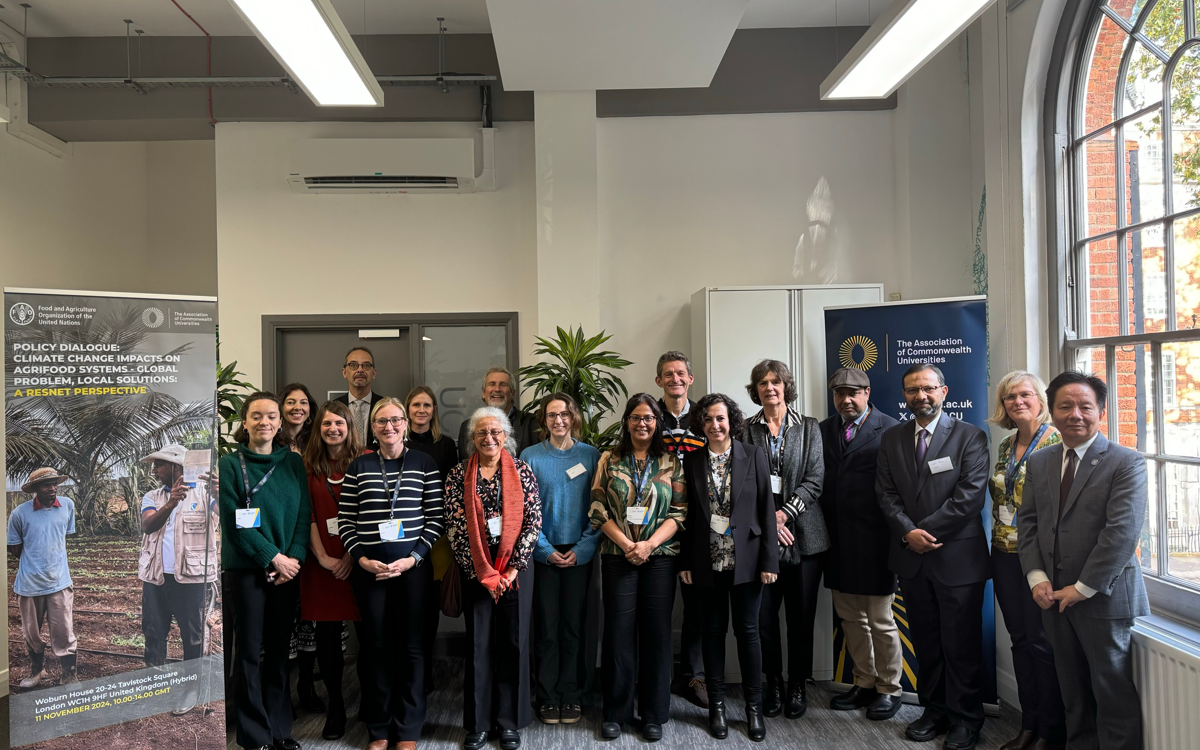
London, UK – On 11 November, the Food and Agriculture Organisation (FAO) of the United Nations and the ACU convened a policy dialogue at the ACU’s headquarters in London. The event brought together leading academics from prominent universities in the UK, Europe and Africa along with public, INGOs and private sector representatives to discuss the urgent issue of climate change and its impacts on agri-food system transformation.
Discussions highlighted the critical role of agri-food system transformation in advancing the Sustainable Development Goals (SDGs). Participants underscored that achieving meaningful progress on these global goals requires a coordinated international effort, especially from the research and academic communities. The consensus was clear: a global coalition of researchers and universities is essential to deliver demand driven research in solving local problems to spearhead transformative changes in food systems globally.
In response to the need for cohesive research efforts, FAO is attempting to form a dedicated research network (RESNET) on agri-food systems transformation. The platform’s objective is to synchronise global research efforts, fill knowledge gaps, anticipate future research needs, and strengthen and support ongoing and future research projects, minimising duplication of efforts and ensuring efficient use of resources.
Leveraging south-south and triangular cooperation, RESNET is envisioned to deploy existing and new knowledge amplifying impact and effectiveness of research to tackle some of the most pressing issues within food system transformation.
Speaking to the need of such network, Mr Anping Ye, South-South and Triangular Cooperation Division (PST), Director, Food and Agriculture Organization of the United Nations (FAO) said: “By connecting universities worldwide, these collaborations will address global food security challenges and promote sustainable agricultural practices across diverse contexts.”
In his concluding remarks he also added: “I am confident that south-south and triangular cooperation partnerships and networks, such as RESNET, can create impactful outcomes and address and bridge complex and multifaceted issues underpinning agrifood system transformation from the north and the south”.
Professor Colin Riordan, ACU Secretary General and Chief Executive, said: “We have a unique network of 400 member universities in more than 40 countries around the Commonwealth. By creating connections and research partnerships between food systems experts across our diverse network, we hope to help address the complex challenges of international farming and agri-food systems.
"We're excited to be part of this ambitious project, and to contribute to creating a healthier and more sustainable future for all."
As a leading nation and key resource partner, the UK has affirmed its commitment to addressing climate change, food security/systems and biodiversity as top national and international priorities. This is exemplified by the integration of these themes into its international development strategy and its pledge to support research on agri-food systems transformation.
Dr Tim Willis, Associate Director International at the Biotechnology and Biological Sciences Research Council (BBSRC), part of UK Research and Innovation (UKRI), said: “The timing of this event aligns perfectly with critical budget allocations, reinforcing UK Research and Innovation’s commitment to advancing interdisciplinary research across agriculture and food systems.
"We're proud to integrate multidisciplinary areas like health and economics into agri-food research, as these connections are essential for impact.”
RESNET aims to connect over 600 universities from 100 countries across the globe by building on the ACU’s university membership of over 400 member universities across the Commonwealth, RUFORUM’s membership of 175 universities across 40 countries in Africa and the Centre for International Cooperation (CIS), and members of the Amsterdam Centre for World Food Studies (ACWFS), represent some 25 universities across 14 countries in Africa. A coalition of partnerships and coordinated action across these institutions via RESNET is set to boost and drive research and innovation on agri-food systems transformation, amplifying the effectiveness of ongoing and future research needed to meet the SDGs. The stipulated activities of the RESNET will be leveraging south-south and triangular cooperation.
As the dialogue concluded, participants emphasised that the path forward requires sustained international cooperation, continued investment in action and demand driven research, and unwavering commitment to tackling the complex challenges of climate change through the transformation of the agri-food system via the deliberate coordination of efforts.
